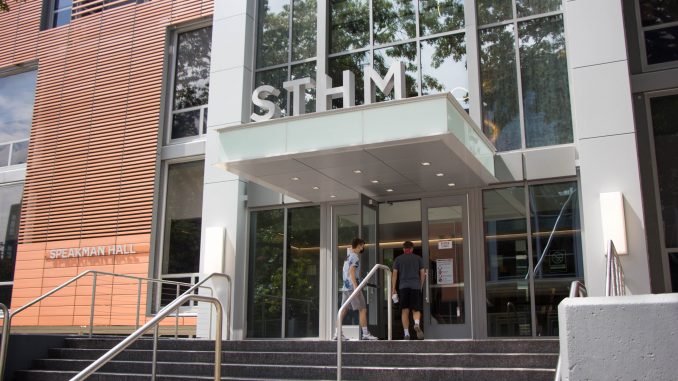
With the COVID-19 pandemic influencing the future of the sports, tourism and recreation industries, Caroline Heffernan thinks studying it must be a part of classes this semester.
“The requirements haven’t changed, but [COVID-19] has become a major talking point specifically in our core classes,” Heffernan, a sport and recreation management assistant professor said. “We’re trying to figure out how students can contribute to smaller scale projects that will help them get industry experience for what cannot be done remotely.”
The pandemic is forcing students and professors in the School of Sport, Tourism and Hospitality Management to examine a sports and tourism world battered by closures and layoffs this year. As students prepare for a competitive field with dwindling job opportunities, they analyze the post-COVID-19 future of the industry in class, while professors find new ways to get students job experience.
In August, the World Travel and Tourism Council predicted a loss of nearly 200 million tourism jobs due to travel restrictions and cancelled events as a result of the pandemic. States and municipalities nationwide have lost around $16.8 billion in tax revenue from the hotel industry, according to a June report by Oxford Economics.
Large entertainment companies are struggling as well, like MGM Resorts laying off 18,000 employees at the end of August and sports media network ESPN projecting a loss of $12 billion in revenue in May.
The school’s Center for Student Professional Development is collaborating with industries to create opportunities like micro internships, short-term paid assignments and projects that allow students to gain industry experience, Heffernan said.
Heffernan isn’t concerned about long term job prospects for students because she believes the industry will rebound at some point. But, she admits there is uncertainty about when things will return to normal.
“There is such demand for our industry that I know that when it’s safe for us to return we will see a return with a vengeance,” she said. “When that return is going to be allowed, no one can make an accurate forecast of that.”
Leyna Bradley, a senior tourism and hospitality management major, saw the industry change in March when her marketing internship at ADVENT Consulting, LLC was cut short when the office closed.
“They couldn’t do anything anymore, so they had to let me go,” she said.
Bradley is uncertain what the job search will look like after graduation, she said. For students and professors the school, change is inevitable in such a dynamic line of work, she added.
Although networking virtually is different from the face-to-face interaction that students are used to having, there are advantages of conducting professional development opportunities remotely, like allowing people to attend events they would have otherwise been unable to, Bradley said.
Bradley was supposed to attend an in-person conference in Chicago, Illinois this year but attended virtually after it was cancelled, she said.
Antonio Fedd, a junior sport and recreation management major, thinks the industry is in a better place now than it was when widespread shutdowns occurred in March.
“You can see how the NBA and WNBA made a bubble with limited fans so the industry is still trying to find a way around everything that’s going on even if it isn’t normal circumstances,” he added
Fedd’s classes have been focused on COVID-19 and current events, like calls for diversity and inclusion in workplaces as a result of the Black Lives Matter movement, he said.
He’s concerned about his ability to get a job once he graduates, Fedd said, but thinks networking can allow students to access opportunities they otherwise wouldn’t have had due to COVID-19.
“It’s always at the back of my mind,” he said. “I feel like it’ll be hard, but if you build connections during your time at Temple it’ll make it somewhat easier than just being anyone who’s looking for a job right now.”
CORRECTION: A previous version of this article inaccurately spelled the School of Sport, Tourism and Hospitality Management’s name.


Be the first to comment